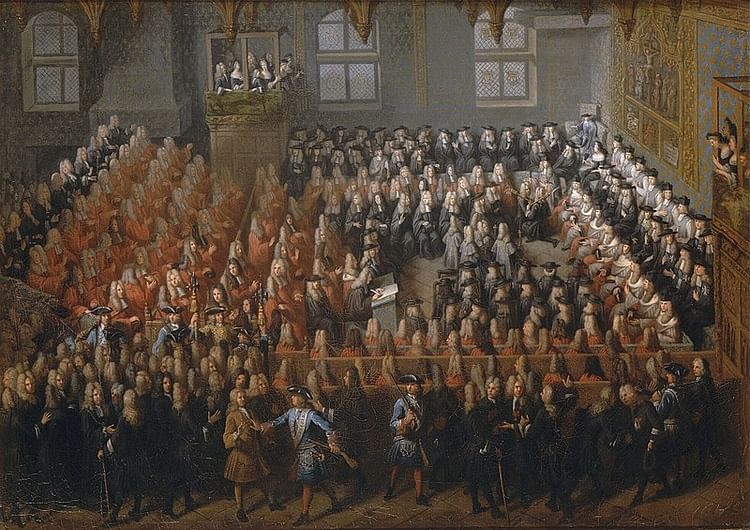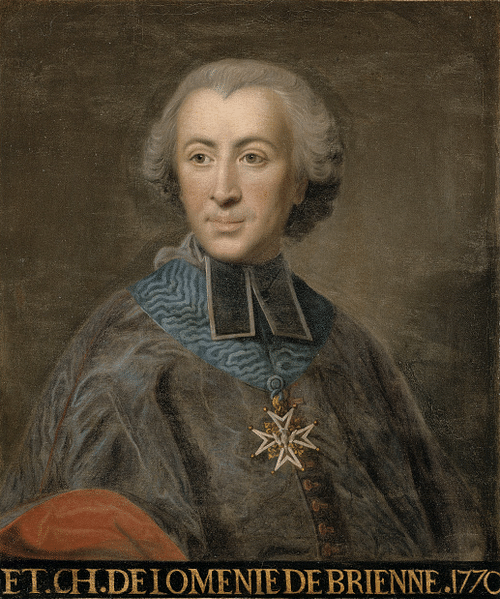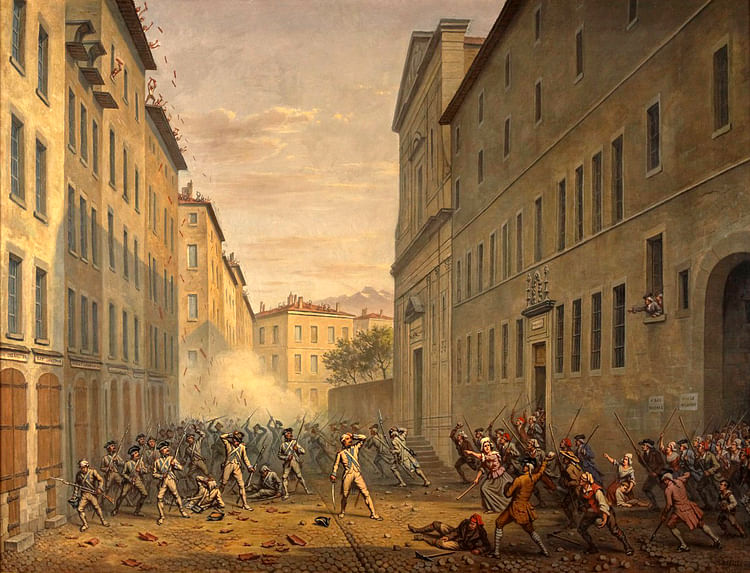
The Revolt of the Parlements of 1787-1788, was the climax of a power struggle between the royal authority of King Louis XVI of France (r. 1774-1792) and the Parlement of Paris, the most powerful of France's thirteen parlements, or high judicial courts. The parlement's resistance to the king's financial reforms forced the king to summon a meeting of the Estates-General.
France's financial crisis, rooted in decades of lavish spending as well as a disjointed system of taxation, drove the king to turn to the parlements in 1787 with his reforms since they claimed the authority to register any royal edict. These courts had a history of opposing the French monarchy stretching back to the Fronde Rebellion (1648-1653), and they resisted, declaring that only an Estates-General could approve such measures. The resulting power struggle became a battle against the principle of absolutism, occurring as French finances, already at a critical point, continued to worsen.
The Revolt of the Parlements was a major clash between the king and estates of France in the leadup to the French Revolution (1789-1799). Since the most important of the king's reforms were never realized, France became bankrupt, hastening the meeting of the Estates-General in 1789 as well as the start of the Revolution.
Background: Parliamentary Power
France's 13 parlements were the highest judicial courts in the kingdom, second in authority only to the king himself. They varied wildly in jurisdictional size, with the largest and most powerful, the Parlement of Paris, having jurisdiction over a third of the kingdom. The parliamentarian judges, of which there were at least 12 to a court, were mostly aristocratic, although a good portion had been wealthy bourgeoisie who purchased their offices, becoming ennobled in the process. This subset of administrative aristocrats became known as the nobility of the robe. Despite consisting of mostly members of the Second Estate, parlements claimed to represent all three estates of pre-revolutionary France in the absence of an Estates-General. Since the Estates-General, a representative body of all three estates called at the pleasure of the king, had not met since 1614, the parlements took its authority for themselves.
Parlements checked the king's authority and exerted their own, through their power of registration. Although they had no legislative powers of their own, the parlements claimed the right to scrutinize and register any new laws or edict the king wished to pass, reserving the authority to reject any edict they did not like. When refusing to register an edict, the parlements would publish remonstrances, or written explanations of their grievances against the policy. As an absolutist monarch, the king retained the right to register his edicts without parlement consent. He could do this by issuing a lit de justice, which required he attend a session of parlement where he would force a registration.
As the parlements grew in power, they began to question the legality of lits de justice and sometimes declared such forced registrations to be illegal, in which case, the parlement would be temporarily exiled from its seat of power by order of a lettre de cachet, a writ ensuring the king's will be carried out. The legality of both lits de justice and lettres de cachet would be widely questioned by the time of Louis XVI.
Since the failed Fronde Rebellion against Louis XIV of France (r. 1643-1715), the parlements maintained a long tradition of resisting the king's authority, especially on fiscal matters. In the final years of the reign of Louis XV of France (r. 1715-1774), they had grown so comfortable blocking royal edicts that the king found it difficult to get anything done. Spearheaded by his chancellor, René de Maupeou, Louis XV's government dissolved the Parlement of Paris in 1771 and worked to create an entirely new system of parlements more agreeable to his political agenda. All this was undone when a young and impressionable Louis XVI came to the throne in 1774, who would fire Maupeou and restore power to the parlements, a decision he would undoubtedly come to regret.

Loménie de Brienne vs. the Lions of Parlement
As the Kingdom of France tottered on the brink of total bankruptcy, Charles Alexandre de Calonne, latest controller-general to Louis XVI, came up with a list of financial reforms he hoped would save the treasury. Centered around a land value tax applicable to every landowner in France, Calonne meant his reforms to circumvent the tax-exempted privileges of the upper two estates (clergy and nobility). Rather than take his proposed edicts directly to the notoriously troublesome parlements, Calonne instead called the Assembly of Notables of 1787, expecting a gathered council of the most distinguished men in France to rubberstamp his reforms.
His plan backfired when the notables refused to agree on anything, declaring that only an Estates-General had the authority to issue such sweeping financial reforms. On 8 April 1787, Calonne was fired and replaced with Étienne Loménie de Brienne (1727-1794), the 60-year-old archbishop of Toulouse and a close ally to the queen, who was invested with the title of Chief Minister of France. Realizing the assembly was no closer to reaching a helpful conclusion, Brienne dissolved it on 25 May and decided instead to try his luck before the parlements.
At first, it looked as though Brienne might get the job done. In May and June 1787, he presented his edicts to the Parlement of Paris, which passed some of the more minor reforms with little opposition, including freeing up the grain trade, the abolition of internal customs barriers, and the creation of provincial assemblies to oversee aspects of taxation. Alongside Calonne's land value tax, Brienne also proposed a new stamp duty of his own, designed to supplement the land tax revenue. As ambitious as this may have seemed, Brienne was soothed by older members of parlement, who assured him that he could expect a degree of cooperation.

Evidently, this feeling was not shared by all the magistrates. With some feeling that this close cooperation with the crown was a betrayal of the proud parliamentary tradition of rebellion, an oppositional group quickly formed, led by Jean-Jacques Duval d'Eprémesnil, who had previously spoken of his desire to see a de-Bourbonized France. Many of d'Eprémesnil's followers wished to see a strengthened parlement take on a more active legislative role, while others believed in the immediate convening of an Estates-General, seeing it as the first step to a new France. While Brienne had hoped that the parlement would momentarily put aside its political differences to save the nation, it seemed as though "the lions of parlement were disinclined to political mercy" (Schama, 262). On 2 July, parlement wholly rejected Brienne's stamp duty, and two weeks later, the seminal land value tax, too.
Echoing the conclusion of the Assembly of Notables in their remonstrance, members of the parlement insisted that only an Estates-General had authority over matters of finance and the parlement could not register tax edicts at all, despite, in the sarcastic words of Thomas Carlyle, "having done it by mistake these last centuries" (75). The decision became popular, seen by many as an attempt by the parlement to resist the tyranny of France's absolutist monarchy. Large crowds began to gather outside parlement meetings in shows of support, while all over the country salons of high society and political clubs applauded the parlement's decision.
This defiance finally grabbed the attention of the king, who had spent the last few months sulking and wallowing in self-pity following the unexpected resistance of the notables. On 6 August, Louis XVI ordered a lit de justice, convening a meeting in the grand chamber of the Palais de Justice. Hundreds of magistrates and high officials packed the room on that hot summer day when the opening proceedings were interrupted by the sound of snoring. Louis XVI, it seemed, had fallen asleep.

Despite the king's gaffe, his ministers fulfilled the purpose of the lit de justice and ordered the rest of the edicts be registered, regardless of the parlement's consent. The next day, d'Eprémesnil declared this forced registration of edicts to be illegal and therefore null and void, an announcement that the parlement formalized with a grand remonstrance, stating that "the constitutional principle of the French monarchy was that taxes should be consented to by those who had to bear them" (Schama, 264). On 10 August, the parlement intensified its counterattack by opening criminal proceedings against Calonne, who by this point had begun his exile in Britain.
This resistance to royal authority was too much for the king. On 15 August, he responded by exiling the Parlement of Paris to the city of Troyes under a lettre de cachet, sending Swiss Guards to the Palais de Justice to ensure the order be carried out. Knowing this would be an unpopular decree, the king ordered soldiers to raid printers, shut down journals, and close any political club that was suspected of harboring opposition.
Reaching a Compromise
The exile of the parlement caused mass protests in Paris. The forced registrations of the edicts in the lesser courts, overseen by the king's brothers, were met with catcalls and jeers, with some people even picking fights with the princes' bodyguards. Against this tense atmosphere, some of the king's ministers wished to emulate Maupeou and break the power of the parlements once and for all. Brienne, however, favored negotiation, believing that the exiled parlement would have time to cool off and come to their senses.
To ease tensions, Brienne offered a compromise. He would rescind his unpopular stamp duty and the land value tax, replacing them with a renewed vingtième (twentieth) tax, which would be collected for five years, and which the nobility would be exempted from paying. This was necessary to avoid bankruptcy. In return, Brienne proposed that an Estates-General would be summoned in 1792, at the end of that five-year period. This was seen as acceptable by the parlement, which was allowed to return to Paris in September. On 19 November, a royal session was held at the Palais de Justice, called to discuss these terms.
The atmosphere of the meeting was tense; magistrates were made uneasy by the presence of military guards, and d'Eprémesnil quickly got into a heated argument with the Comte d’Artois, the king's youngest brother, over carriage parking. Brienne began the session with a show of goodwill, asking for civil rights to finally be accorded to French Protestants, an idea that was met with general approval. He then set the real business of the day before the magistrates, announcing his new tax plan as well as proposing to borrow 420 million livres during the five years preceding the proposed Estates-General so he could make the Crown's current payments on time.
For the next eight hours, as magistrates voiced their opinions, things seemed to be going well. Even d'Eprémesnil expressed his reluctant support for the new loans, although he wished for the Estates-General to meet in 1789 rather than 1792. However, the king, perhaps irritated by the discussion of the Estates-General and determined to avoid a vote, spoke up and ordered the immediate registration of the proposed edicts, thereby killing all discussion and effectively issuing an impromptu lit de justice.
His decree was met with stunned silence, which was finally broken by the unlikeliest source. The man who rose to his feet to challenge the king’s abuse of authority was none other than Louis Philippe II, Duke of Orléans (1747-1793), the king's cousin and head of the Orléans cadet branch of the royal dynasty. Orléans, who would later renounce his noble titles during the Revolution and go by Philippe Égalité, declared his cousin's forced registration to be illegal.
Caught off guard, the king responded, "The registration is legal because I've heard the opinions of everyone." This non sequitur was followed by an awkward joke in which he sarcastically told Orléans, "Oh well, I don't care. You're the master, of course" (Schama, 268). Louis XVI and his brothers then promptly stormed out of the session, which sat for 3 more hours as members formally denounced the king's registration, with Orléans reciting an obviously prepared text that confirmed the illegality of the procedure.
The Crown Strikes Back
The following day, a humiliated Louis XVI ordered Orléans to be exiled to his country estate, a propagandic victory for Orléans, who seized the opportunity to present himself as a martyr for the cause of liberty. By spring 1788, it had become clear that the incident on 19 November had killed any hope for collaboration between king and parlement. On 11 April 1788, the Parlement of Paris declared that "the will of the king is not enough to make law," and on 3 May, it declared that an Estates-General was a precondition of future taxation and that lettres de cachet and other arbitrary arrests were illegal (Schama, 268).
The Crown responded to this denial of absolutist authority by striking hard. On 6 May, the order was given to arrest d'Eprémesnil and Goislard, another opposition leader. The two men took refuge with the parlement, which refused to give them up for 11 hours, declaring that the king would have to arrest them all. This defiance quickly crumbled after the king sent in soldiers, and d'Eprémesnil and Goislard gave themselves up to avoid violence.
Meanwhile, the king's ministers began drafting up several judicial reforms meant to usurp the parlements' powers. 47 subordinate courts were to be upgraded to the status of grand bailliages and would assume the legal functions of the parlements while a new Plenary Court would be created to assume the parlements' registration duties. The Plenary Court would assume the role of the highest court in the kingdom, its members directly appointed by the king. These reforms would effectively leave the parlements as nothing more than glorified arbitration courts, restricted only to cases involving the nobility and civil cases concerning 20,000 or more livres. Should this new judicial system take effect, more power would be stripped from the nobility and funneled back into the hands of the king.
This decree was met with a nationwide uproar. In Paris, lower courts refused to register new laws, while the bar refused to cooperate with the new judicial structure. In the provinces, some parlements ignored the new system and attempted to continue their work, resulting in their exiles from their seats of power through lettres de cachet. When the military governor of Dauphiné attempted to oversee the exile of his province's parlement, riots broke out in Grenoble on 7 June, in which soldiers were attacked with projectiles thrown from rooftops in an incident that would become known as the Day of Tiles. On 29 June, rioters in Pau smashed in the locked doors of their parlement and reinstated their magistrates. Deputies sent from Brittany to Versailles to denounce the king's ministers as criminals were arrested on the road and imprisoned in the Bastille.

More pressure was piled on Brienne when the assembly of the clergy, his own estate, joined the protesting nobility in denouncing the Crown's actions. While the estates bickered with the Crown, the metaphorical ship of France’s finances continued to sink. On 13 July, a freak summer hailstorm destroyed much of the crops in the Paris Basin, meaning that the peasants would have difficulty meeting the tax demands of 1789. Even more significant, in August, against a backdrop of nationwide protests, Brienne was informed that the treasury was finally empty. In a desperate attempt to revitalize the country's credit, Brienne announced a specific date for the convening of an Estates-General, scheduling it for 1 May 1789. Yet it was much too late; the ship had already sunk. On 16 August, the treasury officially suspended all payments; the state was bankrupt.
With panic seizing the markets, Brienne did the only thing he could. Working with the queen, he advocated for the return of popular finance minister Jacques Necker, an act that served to temporarily calm the mounting chaos. The day after Necker agreed to serve, Brienne resigned on 25 August. As Brienne had promised, the Estates-General would meet in May 1789, and the fate of the country was sealed.
Significance
Although parlements had been a thorn in the side of the French kings since at least the reign of Louis XIV, their revolt in 1787 was different. Even France's financial crisis, as existential as it was, could not reconcile king and parlement. This was due in part to a stubborn Louis XVI desperately clinging to old vestiges of absolute power, as well as the identity the parlement had bestowed upon itself, as the champion of the estates, and the defender of ancient noble privilege.
As king and parlement squabbled, the situation worsened, and the events that triggered the start of the Revolution were hastened. There is some irony in the fact that neither monarchy nor parlements would survive the coming Revolution. Moreover, the fact that they were self-declared champions of the people did not save d'Eprémesnil and Orléans from the guillotine during the Reign of Terror, while Brienne would swallow poison to avoid meeting the same fate. Since the Revolt of the Parlements only exacerbated France's worsening conditions, historian Simon Schama has a point when he refers to the episode as "the old regime committing suicide" (287).







